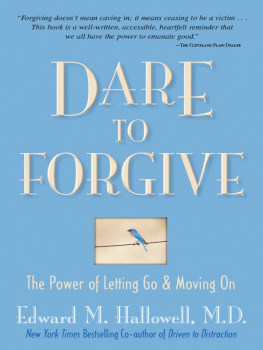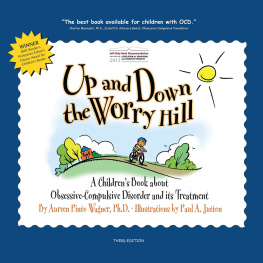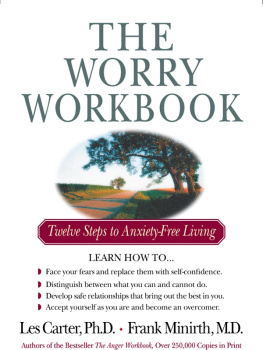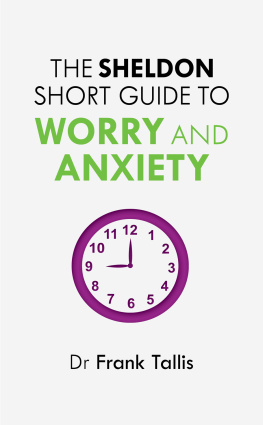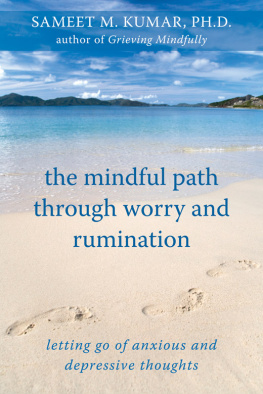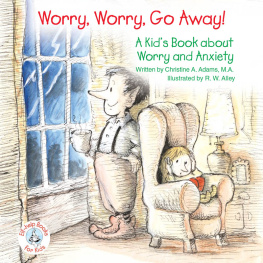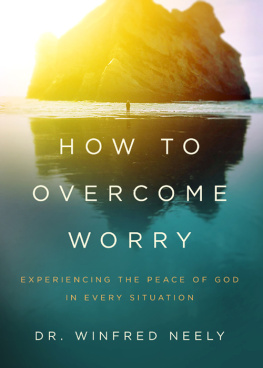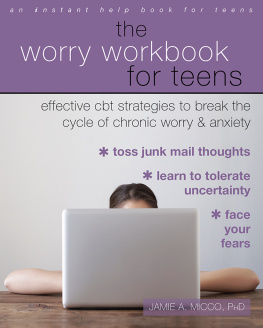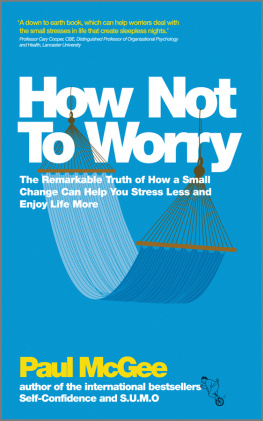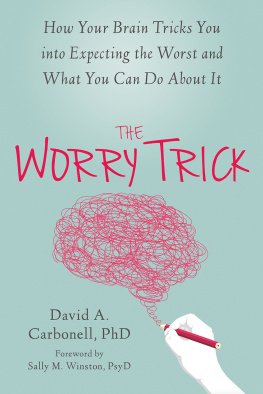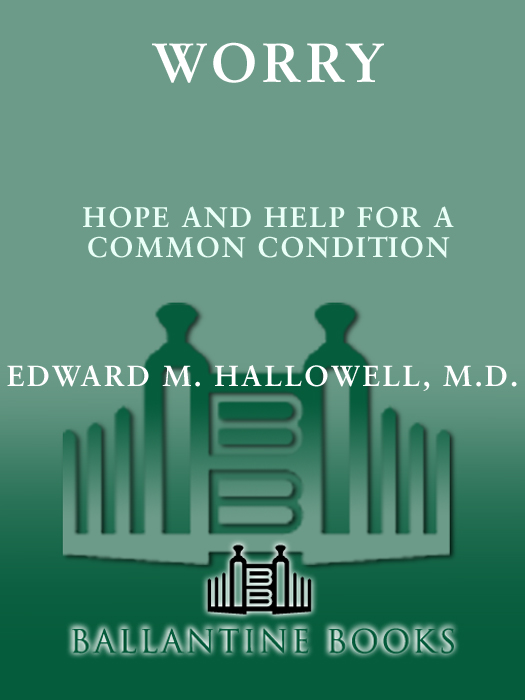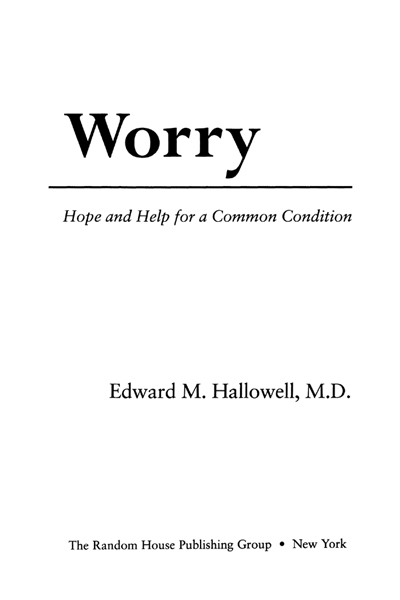More praise for Worry
Dr. Hallowell explains the universal problem of worry in its normal and abnormal forms. His book will be helpful for anyone who has experienced unnecessary worryand who hasnt? It is eminently readable and spiced with informative case examples. He offers sage advice about what to do about worries.
A ARON T. B ECK , M.D.
Author of Anxiety Disorders and Phobias:
A Cognitive Perspective
Wisdom, eloquence, and practicality braid together to make this book must-reading for anyone who ever worries.
P RISCILLA L. V AIL , M.A.T.
Author of Emotion:
The On/Off Switch for Learning
Straightforward and engaging, almost conversational at times What perhaps most distinguishes Hallowells book is its holistic approach. The authors multi-dimensional exploration of worrys causes balances the genetic, physiological, psychosocial, and attitudinal.
Kirkus Reviews
In a voice both authoritative and compassionate, Hallowell thoroughly explores a topic that touches nearly everyone in this age of anxiety [and] provides abundant information on a wide variety of alleviating treatments.
Publishers Weekly
Common-sense tips worth the cover price Money well spent.
Austin American Statesman
A LSO BY E DWARD M. H ALLOWELL , M.D.
What Are You Worth? (with William Grace Jr.)
Finding the Heart of the Child: Essays on Children, Families, and Schools (with Michael Thompson, Ph.D.)
Driven to Distraction (with John J. Ratey, M.D.)
Answers to Distraction (with John J. Ratey, M.D.)
When You Worry About the Child You Love: Emotional andLearning Problems in Children
Connect: 12 Vital Ties That Open Your Heart, Lengthen YourLife, and Deepen Your Soul
Human Moments: How to Find Meaning and Love in YourEveryday Life
The Childhood Roots of Adult Happiness: Five Steps to Help Kids Create and Sustain Lifelong Joy
A Ballantine Book
Published by The Random House Publishing Group
Copyright 1997 by Edward M. Hallowell, M.D.
Introduction 2002 Copyright 2002 by Edward M. Hallowell, M.D.
All rights reserved.
Published in the United States by Ballantine Books, an imprint of The Random House Publishing Group, a division of Random House, Inc., New York, and simultaneously in Canada by Random House of Canada Limited, Toronto.
Ballantine and colophon are registered trademarks of Random House, Inc.
www.ballantinebooks.com
Library of Congress Catalog Card Number: 98-96150
eISBN: 978-0-307-79091-0
The edition published by arrangement with Pantheon Books, a division of Random House, Inc.
v3.1
To Josselyn Bliss,
my cousin, but also sister, mother, friend, manager, agent, editor, confidante, babysitter, problem solver, advisor, and all-around improver of my life
Worry:to strangle, throttle, kill by violence to seize by the throat and tear or lacerate, e.g., dogs or wolves attacking sheep
Oxford English Dictionary
Contents
Chapter 1. When Life Feels More Threatening Than
It Should
Chapter 26. Fifty Tips on the Management of Worry
Without Using Medication
Preface
E xcessive worry is an exhausting and dangerous problem for millions of Americans. People who worry a lot suffer, as do the people close to them. Some people worry so intensely that worry becomes much more than an annoyance: it hinders their work, their personal lives, or both. A recent survey of primary care physicians in the United States reported that at least one-third of office visits were prompted by some form of anxiety. Furthermore, over the course of a lifetime at least one in four people25 percent of the population or some 65 million individualswill meet the criteria for one or more of the medical conditions called anxiety disorders, treatable disorders defined by the presence of debilitating worry.
Like high blood pressure, excessive worry can make you physically sick; it can even kill you. As Dr. Charles Mayo of the Mayo Clinic said years ago, Worry affects circulation, the glands, the whole nervous system, and profoundly affects the heart. I have never known a man who died from overwork, but many who died from doubt.
Worry is a core component of numerous medical disorders and is central in many solvable, if not medically diagnosable, problems in life, such as excessive pessimism, timidity, procrastination, and underachievement. The key to dealing with it is to acquire the knowledge that will allow you to approach worry as a problem you can manage, as opposed to suffering worry as if it were a miserable, immutable given.
The fact is that tens of millions of Americans suffer from some treatable kind of worry without knowing either that there is a medical name for what they are suffering from, or that there are affordable, practical treatments that can help them get over what theyve got.
Worry is like blood pressure: you need a certain level to live, but too high a level can hurt you. Most people dont realize that worry, like blood pressure, can be regulated. In fact, we can use some of the same treatments we use for high blood pressure to reduce excessive worry, treatments such as meditation, exercise, stress reduction, dietary modification, and certain medications. In addition, we now have various new treatments specifically designed for worry that are highly effective. Most of these do not involve medication, but even the medications we use now are safer and more effective than ever.
Each generation needs to update itself to keep abreast of new methods for dealing with a problem as ubiquitous as worry. The best-selling book about worry in the last generation was Dale Carnegies How to Stop Worrying and Start Living: Time-Tested Methods for Conquering Worry. The book originally had great appeal, but todays audiences might find its tone and suggestions somewhat nave, and of course its scientific content is a bit out of date. While in some ways Carnegies advice is timeless, a tremendous amount of new information has become available since 1944, the year the book was published.
Most people today are not aware of all that we have learned about worry in the last fifty-odd years. Although we have new knowledge, it spreads slowly, even in this age of instant access. People need to know how much we now understand about the treatable conditions that involve worrysuch as depression, panic disorder, obsessive-compulsive disorder, generalized anxiety disorder, post-traumatic stress disorder, and attention deficit disorder, and they also have to learn about what we know concerning the ordinary worry of everyday life. The good news is that we know much more today than we did in Carnegies time and we have practical methods of treatment that our parents generation never heard of.
When worry becomes toxic it ceases to serve as the useful built-in alarm system nature meant it to be and becomes instead a painful problem in itself. As a car alarm system that wont shut off, our human alarm system can drive its owner crazyand get him into troublewhen it wont silence itself.
Sufferers of excessive worry know they worry more than they need to, but they dont know how to stop. They suffer with worry as if it were inescapable. Although reassurance can help temporarily, people who worry too much require more than simple reassurance or some hearty exhortation to buck up. They already know they should buck up and worry less; what they yearn to know is


